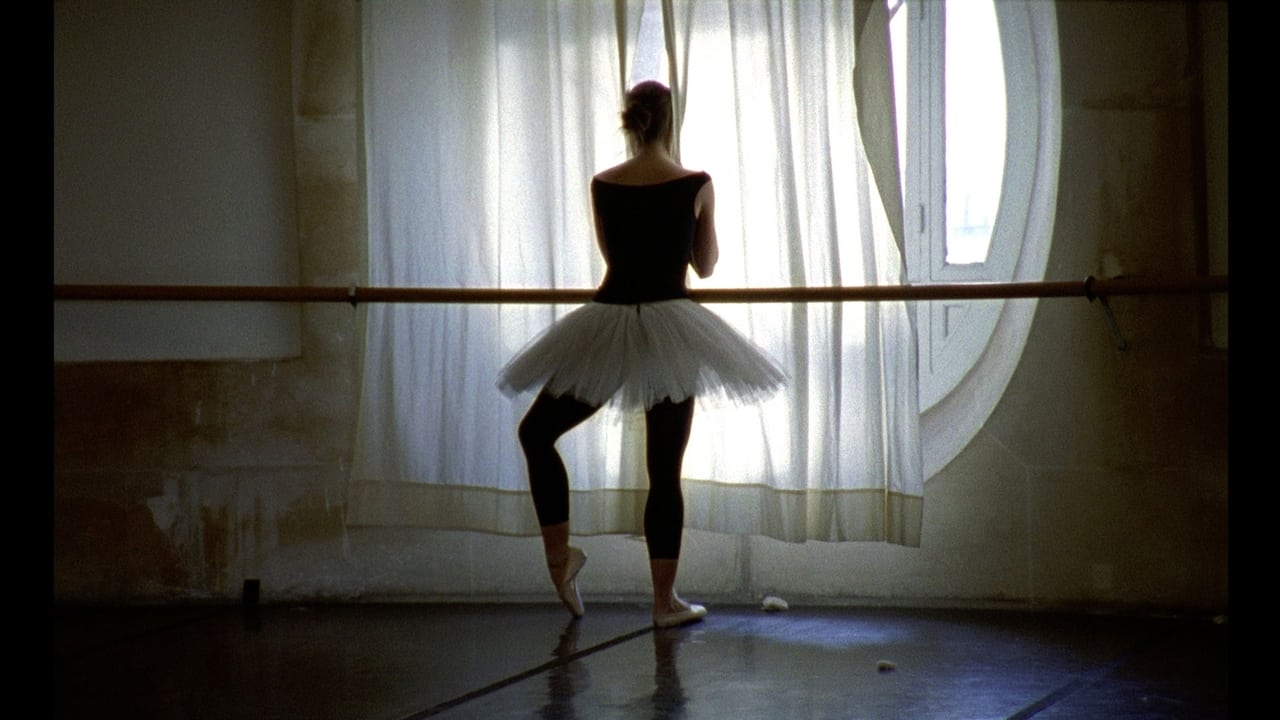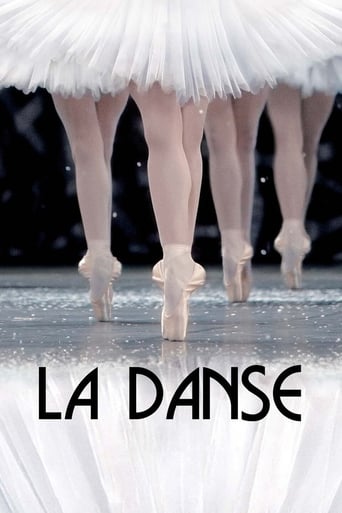Fluentiama
Perfect cast and a good story
Siflutter
It's easily one of the freshest, sharpest and most enjoyable films of this year.
Derry Herrera
Not sure how, but this is easily one of the best movies all summer. Multiple levels of funny, never takes itself seriously, super colorful, and creative.
Darin
One of the film's great tricks is that, for a time, you think it will go down a rabbit hole of unrealistic glorification.
Renereedge
If you are a very devoted fan of ballet you might appreciate seeing how professional dancers work when practicing.Other than that, this movie is horrible. It is about two hours too long, the cuts are weird, lightning gloomy where no gloom is needed, no discussion, explanation, elaboration, investigation or anything else otherwise associated with documentaries.If you love seeing shaky hand-held vistas of Paris rooftops you might like the footage, although I'm sure the tourist office of Paris has much better films for free.I sat through the entire movie hoping for something to happen, some twist, conclusion, anything. Nothing. I left the theatre with an empty feeling, wishing I could have those long hours of my life back.Oh, and dancing and cinema are two of my largest passions in life.
peterinstockholm
The documentary director Frederick Wiseman, has been much acclaimed for his bare and non-narrative style. He just places a camera somewhere and register what happens. No information about the action or the people involved is given. But Wiseman did choose the locations. He did choose what to register. And for how long each set and set of actions are supposed to roll. (And that is long, very long). The result is a deceptively documentary narrative about the Paris Opera. But the story told is of course Wiseman's interpretation of the Paris Opera.We all know that documentaries are the result of a personal vision, there is no such thing as objectivity. But we have to remind ourselves of this watching La Danse, as it is seemingly devoid of valuation.Here are some examples of what Wiseman chooses to show and emphasize (randomly presented à la Wiseman): Dancers do not talk with each other. Dancers are silent, anonymous people. The artistic director never looses her temper. Almost no one in this movie loses his or her temper. The only black people at the Paris Opera are cleaners or cashiers. The food in the Opera's canteen is pale and colorless, like hospital food. The bread in the canteen is guillotined. The modern ballets of the Paris Opera are full of violence, anger and frustration. The longest ballet scene in the movie is a literal blood bath from Medea. Even the scenes from the Nut Cracker look drab and dull. The whole film is dark and gloomy, probably because of the lighting. The dimly lit corridors of the Opera house are narrow and empty of people. The film starts and ends in the claustrophobic catacombs under the Opera House. OK, just a few examples but they say something of Wisemans perspective.This film has nevertheless its fascinating moments, especially the meetings in the artistic directors office. But never have dance and ballet had this joy-less outlook in a movie before. And never before have the images of the roof tops of Paris (frequently interspersed throughout the movie) appeared so refreshing after the sombre rehearsal studios of the Paris Opera.
Todd Bradley
I'm a big aficionado of ballet, and an even bigger fan of film. I especially love documentary film. So as far as I can tell, I'm totally in the target audience sweet spot for this film. And I really wanted to love this film, which - if you haven't figured out by now - is a very intimate look at part of one season of the Paris Opera.But the film left me cold. Not only that, but it left me bored. And it left me wondering how any film director can get funding to make a film that takes such little effort and creativity.This film is done without narration. Not only that, but it's done without any semblance of a narrative thread. From what my date and I could tell, the film makers shot footage of various events happening within the ballet - rehearsals, lessons, meetings, lunch, painting - over the course of several months. Then, they randomly selected scenes from all they shot and just pasted them together into a film. There's no sense of continuity, no sense of a story.There are so many interesting topics that a long documentary film like this could try to address. How does being a top dancer affect your body over time? What do these dancers do when they're not rehearsing? Do they have families? Hobbies? How does a choreographer that only speaks English get a job here when some of the dancers don't understand English? The film doesn't try to answer any of these. Instead it focuses only on what's right in front of your face right now. There is setup after setup, without any payoff. There's a scene showing a difficult meeting regarding retirement benefits for the dancers, due to union negotiations going on. And then the topic is completely dropped, without another word about the union mentioned for the rest of the film. There's a scene where a dancer is complaining that she's being asked to do too many performances and she can't keep up because she's not 25 anymore. And then we never hear about it again.By the end of the film, I was just wondering how the director chose which scenes to put in and which to leave on the editing room floor. And there doesn't seem to be any rhyme or reason to it, from the viewer's perspective. That's why I think the director just selected scenes at random. Maybe putting together a film like this takes some really advanced skill. But to me, it looked like any film student with a decent camera and a lot of time could have made this film.
danddinmont
I learned about the screening of this film in a newspaper insert that appeared a week after free tickets became available for AFI FEST, courtesy of Audi. Applicants were permitted ten pairs of tickets! so not surprisingly no more were available...however there would be a "rush" prior to each screening in the series. When the lights in the the theater went down, this morning at 10:00 AM, it was less than two thirds full. The audience was probably made up equally of ballet and Wiseman film fans, and I think both may have come away with some dissatisfaction. It is one of Wiseman's stocks in trade not to offer explanations, and although there are some fairly obvious clues about scenes from the "Nutcracker", if there were any about the less well known ballets, they went right by me. Unlike his earlier ballet film we learn very little about any individual dancers. Much of the dialog is in French, with English subtitles with the speakers not always identified by name, adding to my confusion. The scenes with the company's artistic director are brilliant, especially the planning session for the visit by a group of major American donors. Transition shots whether of the Parisian cityscape or the curve of a staircase are always gems; and the inclusion of the opera house's beekeeper, again without comment, is an absolute delight. Over all, my quibbles are minor, I think this is a film that fans, both of the ballet and of Frederick Wiseman films will find worth viewing.

